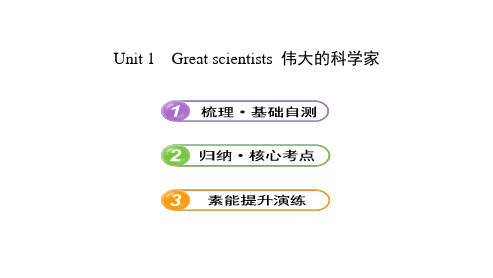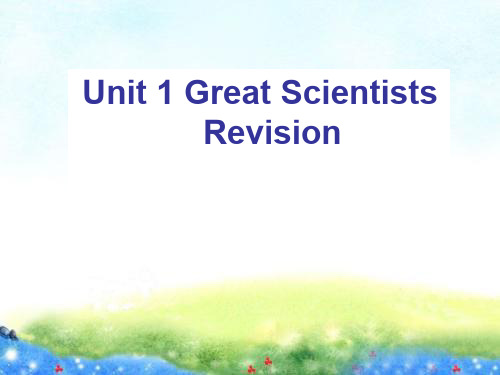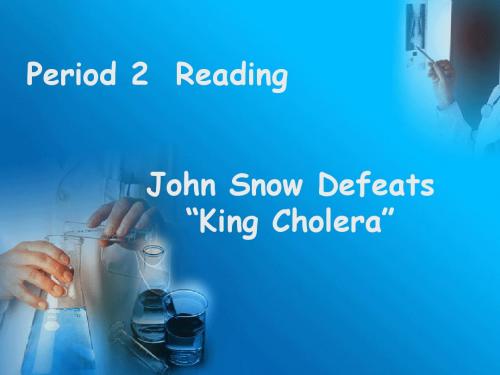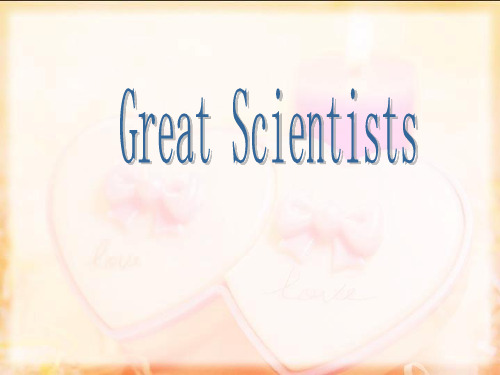新人教版必修五Unit1 Great Scientists课件3
英语:unit1《Great scientists》Period3课件(新人教版必修5)

【解析】选C。考查过去分词作定语。句意为:——那些坐在 教室后面的人能听见我吗?——没问题。seated可看成是who are seated的省略。sit不能用被动表示人坐在那里,seat是及 物动词,表示某人坐在某地要用被动。
4. Five people won the “China’s Green Figure”award, a title ________ to ordinary people for their contributions to environmental protection. A. being given C. given B. is given D. was given
9. All the people present at the party felt ______ at the _______ news. [2010绍兴高一检测] A. shocking; shocking C. shocking; shocked B. shocked; shocked D. shocked; shocking
last year可知应用过去分词作定语,故选B项。
7. Sarah, hurry up. I’m afraid you can’t have time to ______
before the party. A. get changed C. get changing B. get change D. get to change
4. The city is surrounded on three sides by mountains (三面环
山). 5. He got inspired (受到了激励) when he thought of helping others. 6. The book is interesting and I’m interested in (对……感兴趣)
高中英语人教版必修五Unit_1_Great_scientistsppt课件

an outbreak.
every time
3. ____________(为防止) this from happening again,John Snow suggested that To prevent the source of all the water supplies ___ __________(经过检测). be examined
___________ expose. . . to ___________ link. . . to. . . apart from _____________ (be) strict with. . . _________________
7. 讲得通;有意义 8. 应受谴责,应负责任
____________make sense ___________ be to blame
Ⅱ. 短语回放 1. 提出 2. 得出结论 3. 使显露;暴露 4. 将……和……联系或连接起来 5. 除……之外;此外 6. 对……严格的 put forwaw/reach/come to/arrive at a conclusion ____________________________________
conclude(vt. &vi. )结束;推断出→___________ (n conclusion 12. _________ . ) 结论;结束
13. _______ (vt. ) 污染;弄脏→ _________ (n. )污染
pollute pollution 14. __________ (vt. ) 宣布;通告→ ______________ (n. )通知;宣告 announce announcement 15. ________ (vt. )命令;指示;教导→__________ (n. )教授;传授→ ___________ (n. )用法;说明;操作指南 instruct instructions instruction
人教新课标高中英语必修五 unit1 Great scientists Revision 课件(共17张PPT)

举起;张贴
3
提出(建
公布;挂起 议);ecause the suggestion he ___D_____has been turned down,he was in low spirits.
A. put away
B. put up
C. put down
D. put forward
John Snow was a famous doctor in London – so _e_x_p_e_r_t , indeed, that he a_t_t_e_n_d_e_dQueen Victoria as her personal physician. But he became inspired when he thought about helping ordinary people _e_x_p_o_s_e_dto cholera. This was the _d__e_a_dly disease of its day. Neither its cause nor its _c_u_r_e_ was understood. So many thousands of terrified people died every time there was an outbreak. John Snow wanted to face the _c_h_a_l_le_nge and solve this problem. He knew that cholera would never be controlled until its cause was found.
人教版高中英语必修五课件:Unit1 Great Scientists (共19张PPT)

draw a conclusion with certainty
The polluted water carried the disease.
Comprehending
Scientific Report by John Snow
The problem Nobody knew the cause of the serious disease of cholera Idea 1: a strange cloud of gas found its victims The cause people absorbed the Idea 2: disease with meals The method Collect information from the cholera outbreak to prove which theory was correct
Homework
1. Surf the internet to find out: What should we pay attention to in our daily life to prevent ourselves from getting infected with all these infectious diseases? 2. Write down the important words and phrases in your exercise books. 3. Underline the difficult sentences that you cannot understand.
Keep the kitchen clean Cook raw food thoroughly
Dispose rubbish properly. Heal the food left overnight
人教版高中英语必修五Unit 1《Great scientists》ppt课件3

Lin Qiaozhi (l90l--l983), Nelson Mandela the first (1918 -- ) Chinese specialist in former South Africa president women’s disease fight for… Nobel Peace prize 1993
Read the first and last sentences of each para.
Steps:
1. Find a problem 2. Make a question 3. Think of a method 4. Collect results 5. Analyse results 6. Find supporting evidence
What do you think the most important qualities are as a scientist?
interest curiosity cleverness/intelligence diligence/hard work honesty …
new ideas in scientific research
Jane Goodall (l934-- ), British zoologist study chimps
Who is he/she? Their great achievements?
Madame Curie (1867~1934)Poland discoverer of radium the Nobel Prize twice 1903 physics 1911 chemistry
人教新课标高中英语必修五 unit1 Great scientists reading 课件(共14张PPT)

2) Some houses had no deaths. Why1?death
Result : It seemed that the water was to blame.
…
2 death 5 death
Step1,24,…: 3c0o,…ll4e0c:t nruemsubelrtssof houses
Step 1:Find a problem : What was the cause of cholera?
Para.2 What were the two theories?
Theory1: Cholera multiplied in the air.
Theory2: People absorbed the disease into their bodies with their meals.
请用英文简要介绍疟疾和屠呦呦发现青蒿素的过 程。
在今天,疟疾(malaria)对世界公共卫生依然 是个严重挑战。如果你被受感染的蚊子
(mosquito)叮咬,你就有可能感染疟疾。屠呦呦 工作的中药研究所(China Academy of Traditional Chinese Medicine)于1969年开始抗 疟(anti-malaria)药研究。屠呦呦阅读了大量中 医药书籍。在她面临困境的时候,这些书籍给她
attend: take care of
Cholera?
the deadly disease of its day.
What John Snow did: …wanted to face the challenge and solve this problem.
What he found: The disease would never be controlled until its cause was found.
高中英语人教版新课标课件 必修五 Unit 1 Great scientists Section Ⅲ

He collected 4.
of the stars and used all his 5.
research into the
knowledge to explain them.
problem
上一页
返回首页
下一页
Publishing of He showed his theory privately to his friends and was 6.
下一页
根据提示写出下列短语
1.apart
2.(be)strict
...
3.make
4.lead
5.come to
end
除……之外;此外 对……严格的 讲得通;有意义 通向;导致 结束
上一页
返回首页
下一页
6.
times
7.make room
8.be responsible
有时 为……腾地方 对……负责
discovery and ◆He could not publish his theory because the Christian Church
trouble
would have punished him.
上一页
返回首页
下一页
The reasons why
Some 2.
sometimes stopped,moved 3.
(为……做贡献)our
society when he grew up.A reporter wrote a story about the boy and
(向……
投稿)a newspaper.
【答案】 contributed money to;which contributed to;make a contribution to;
Unit 1 Great scientists 课件(38张PPT)必修5英语 人教版

Do you know their names?
Let’s learn about some scientists.
Archimedes He was an ancient Greek mathematician. He found if you put an object into water, the water pushes it up.
all drinking water should be examined to
make sure it is safe.
Answer the questions.
Who defeats “King Cholera“? What happened in 1854? How many people died in 10 days in
Find a problem Para. 1 What causes cholera?
Para. 2
Make a question Which theory is correct?
Think of a method
Para. 3
Collect data on those who were ill or died and where they got their
cause of the illness.
Find supporting evidence
Para. 6 Find other evidence to support the
analysis.
Draw a conclusion
Para. 7 The water was to blame. The source of
What infectious diseases do you know about?
人教版必修五Unit 1《Great Scientists》ppt课件

答案:C
2.What's the use of John Snow's map in his research? A.To help him find the number of dead people.
B.To help him not lose his way.
C.To help him find the reason of the cholera outbreak. D.To help him be understood. 答案:C
1.What inspired John Snow according to the first paragraph? A.Being Queen Victoria's personal physician. B.Finding where cholera happened. C.Helping ordinary people who suffered from cholera. D.Finding the cause of cholera.
disease.
________ John Snow investigated two streets where the
outbreak was very severe. ________ King Cholera was defeated. ________ He found that most of the deaths were near a water pump.
that polluted water was to blame.
(2)Do you think John Snow would have solved this
problem without the map?Give a reason.
人教新课标高中英语必修五 unit1 Great scientists reading课件 (共29张PPT)

_E_x_a_m_i_n_e_ the source of all the water supplies.
II. True (T) or false (F):
1. Cholera would never be controlled even if its cause was found. F
2. The disease attacked the body quickly from the stomach and soon the affected person died. T
Collect results
Repeat if necessary
Draw a conclusion
What do you know about infectious diseases?
Infectious diseases can be spread to other people. They have an unknown cause and need public health care to solve them.
5. Deaths of the woman and her
daughter were linked to the Broad
Street outbreak. T
6. Only ordinary people died when
cholera broke out.
F
III. Choose the best answers. 1. What’s the purpose of the text? A. To show us how difficult it was to find a cure for cholera. B. To tell us how John Snow found the cause of cholera and the cure for it. C. To show us how difficult it was to carry out experiments at that time. D. To tell us the way cholera spread and how serious it was.
高中英语人教版必修五Unit1_Great_Scientists[全单元]ppt课件
![高中英语人教版必修五Unit1_Great_Scientists[全单元]ppt课件](https://img.taocdn.com/s3/m/912789be84254b35eefd349c.png)
汉弗里·戴维 爵士
Thomas Edison
• AGmeenriicuasni(s1o8n4e7-p1e9r3c1e)nt inspiration and ninety-nine percent perspiration.
天才就是百分之九十九的汗水加上 百分之一的灵感。
The Inventions of Thomas Edison
A Brief History of Time
John Snow Defeats “King Cholera”
Pre-reading: Make a prediction about what this text will be about according to the title.
John Snow
10.Who put forward a theory about black holes?
Zhang Heng Stephen Hawking
Thomas Edison
['tɒməs] ['edɪsn]
Leonardo da Vinci
[,liə'nɑrdo]
['vinsi]
Humphry Davy
evidence 7. Draw a conclusion
Careful Reading
---------What causes cholera?
--------Which theory is correct?
--------Gather information when another outbreak hit London in 1854
7. Who was the painter that studied dead bodies to improve his painting of people?
高中英语人教版必修五课件:Unit 1 Great Scientists Section Ⅲ

必修⑤ · 人教版Great Scientists Section Ⅲ Using Language1自主预习2合作探究3写作探究4巩固提升5课时作业自主预习Ⅰ.单词速记1._____________ (v t .)建设;修建→ ________________ (n .)建设;建筑物2.______________ (v i .& v t .)捐献;贡献;捐助3.____________ (adj .)积极的;肯定的;确实的4.____________ (n .)移动;运动;动作→ ________ (v .)移动,搬动5.____________ (ad v .& adj .)向后地(的);相反地(的);退步地(的)construct construction contribute positive movement move backward 6.________ (v i .& v t .)(使)旋转;纺(线或纱)7._______________ (adj .)热情的;热心的→ ______________ (n .)热心;热情8.____________ (adj .)小心的;谨慎的9.__________ (v t .)拒绝;不接受;抛弃10.____________ (n .)宇宙;世界spin enthusiastic enthusiasm cautious reject universe Ⅱ.短语互译1.come ______ an end 结束2.apart ________除……之外;此外3.______ one’s own 某人自己的4.(be) strict ________对……严格的5.lead ______导致;通向6.________ sense 讲得通;有意义to from of with to make Ⅲ.句型结构Only if you put the sun there _______ the movements of the other planets in thesky _____________.只有当你把太阳放在中心位置上,天空中其他行星的运动才能说得清楚。
- 1、下载文档前请自行甄别文档内容的完整性,平台不提供额外的编辑、内容补充、找答案等附加服务。
- 2、"仅部分预览"的文档,不可在线预览部分如存在完整性等问题,可反馈申请退款(可完整预览的文档不适用该条件!)。
- 3、如文档侵犯您的权益,请联系客服反馈,我们会尽快为您处理(人工客服工作时间:9:00-18:30)。
C. Separating those who suffered cholera from those who didn’t
D. Both A and B
8. Who invented a lamp to keep miners safe underground?
A. Sir Humphry Davy B. Thomas Newcomen C. Faraday
9. Who invented the earliest instrument to tell people where earthquakes happened?
Unit1 great scientists
John Snow Defeats “King Cholera”
1.Which scientist discovered that objects in water are lifted up by a force that helps them float?
1 Why couldn’t the cholera be under control at first?
Neither its cause, nor its cure was understood.
2 Which theory did John Snow believe in?
People absorbed cholera into their bodies with their meals.
John Snow
1 Why couldn’t cholera be under control at first?
2 Which theory did John Snow believe in?
3 John Snow finally proved the theory by ________.
A. gathering information with the help of a map
A. Charles Darwin B. Archimedes C. Thomas Edison
2. Who wrote a book explaining how animals and plants developed as the environment changed?
A. Marie Curie B. Gregor Mendel C. Charles Darwin
3.Who invent the first steam engine?
A. Thomas Newcomen B. Archimedes C. Thomas Edison
4. Who used peas to show how physical characteristics are passed from parents to their children.
Neither its cause, nor its cure was understood.
Which person impress you most during the SARS?
What other infectious diseases do you know?
How do they spread from one person to another?
3 John Snow finally proved the theory by ________.
A. gathering information with the help of a map
B. looking into the source of the water for Broad Street and Cambridge Street
A. Stephen Hawking B. Archimedes C. Thomas Edison
7.Who was the painter that studied dead bodies to improve his painting of people?
A. Gregor Mendel B. Leonardo da Vinci hing about cholera?
It was caused by drinking dirty water.
It caused a lot of deaths in the old times in Europe.
Who helped to defeat the disease?
C. separating those who suffered cholera from those who didn’t
D. both A and B
stages in examining a new scientific idea 1.Draw a conclusion:(得出结论)
2.Think of a method:(找出研究方法) 3.Collect results:(收集材料)
A. Charles Darwin B. Zhang Heng
C. Watt
10.Who put forward a theory about black holes?
A. Stephen Hawking B. Archimedes C. Copernicus
What impressed you most in 2003?
A. Thomas Edison B. Gregor Mendel C. Archimedes
5. Who discovered radium?
A. Marie Curie
B. Zhang Heng
C. Newton
6.Who invented the way of giving electricity to everybody in large cities?
